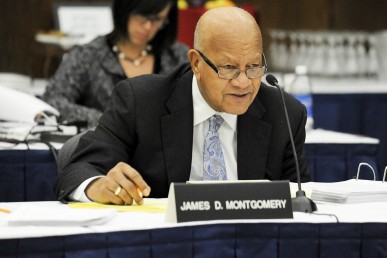Gender reassignment added to student health coverage

Trustee James Montgomery: “I see this as a medical problem, not a moral problem.” Photo: Roberta Dupuis-Devlin/UIC Photo Services
The University of Illinois Board of Trustees approved a request Wednesday from UIC students to cover gender reassignment procedures under the CampusCare student health insurance plan.
“It says something about how this campus is inclusive — about how we see diversity,” said UIC student trustee Ken Thomas after the board meeting in Student Center West.
“Diversity is not just a tool for recruiting. We embrace it and change lives with it.”
“The board’s decision reflects its willingness to listen to the needs of the student population,” said Liz Thomson, assistant director of the UIC Gender and Sexuality Center.
“Studies have shown that when students are able to be their full and whole selves, they are mentally and physically healthier and have increased academic and career success,” she said.
The trustees voted 6-2 to approve a $60 increase per semester for CampusCare that also includes additional benefits for out-of-network emergency care. Of the $60 increase, about $4.50 will go to coverage for gender reassignment procedures.
According to the National Institutes for Health, people with gender identity disorder — “a conflict between a person’s physical gender and the gender he or she identifies as” — are at risk for depression, anxiety and suicide. Treatment includes physical and mental health evaluations and counseling, with hormonal and surgical treatment as an option after a lengthy transition period.
Because the UI Hospital does not perform gender reassignment surgery, it would be covered as an out-of-network procedure, with the student paying 30 percent and CampusCare 70 percent. The lifetime maximum benefit for all related services (mental health, medical, prescriptions and surgery) is $117,096.
The proposal, initiated by a graduate student in 2011, was approved by the three campus student governments. The Gender and Sexuality Center and the Office of the Vice Chancellor for Student Affairs are among the campus units that worked on the initiative, Thomson said.
Trustees Timothy Koritz and Edward McMillan voted against the measure.
Koritz, a Rockford anesthesiologist, expressed concern that some portion of state or federal financial aid might be used to pay the student insurance fee, and “a lot of taxpayers might feel this is not an appropriate use of their tax money.”
Thomas said that state and federal financial aid is used for tuition and “very rarely” covers student fees.
Trustee Pamela Strobel cautioned against the “slippery slope” of making decisions based on taxpayer preferences, adding that, for example, some taxpayers might disagree with certain courses taught at the university.
Koritz also said that, as a physician, he could not “ethically or morally support” the idea of an 18-year-old student having such life-altering surgery.
“At 18 you can sign up for combat,” said trustee Patrick Fitzgerald.
McMillan said students and parents may feel they are “being forced to participate in a program they don’t feel they should be paying for.”
Students can opt out of the CampusCare health insurance plan after their first semester if they submit proof of other health insurance coverage. About 11,500 of more than 27,000 students were enrolled in CampusCare as of fall 2012.
Trustee James Montgomery said the board should respect the views of the UIC students who made the request.
“I see this as a medical problem, not a moral problem,” he added.
According to research by UIC administrators, 37 other colleges or universities provide insurance coverage for gender reassignment, including Northwestern, University of Michigan, Duke, Yale and Stanford.
Aetna Insurance said that last year, there were seven total surgeries at the 19 schools where it provides coverage for gender reassignment.
